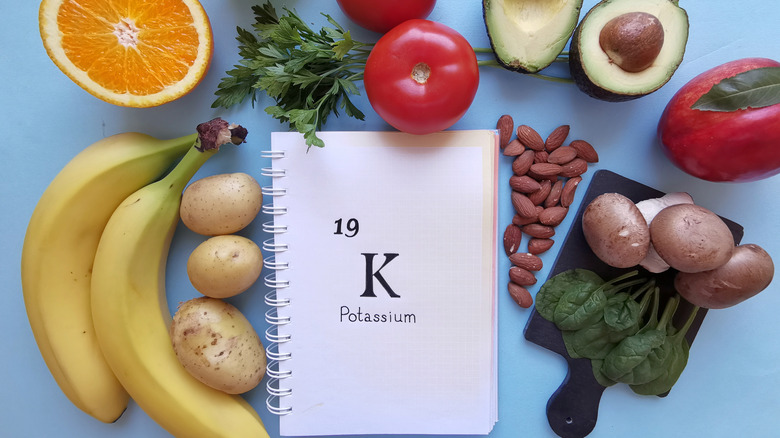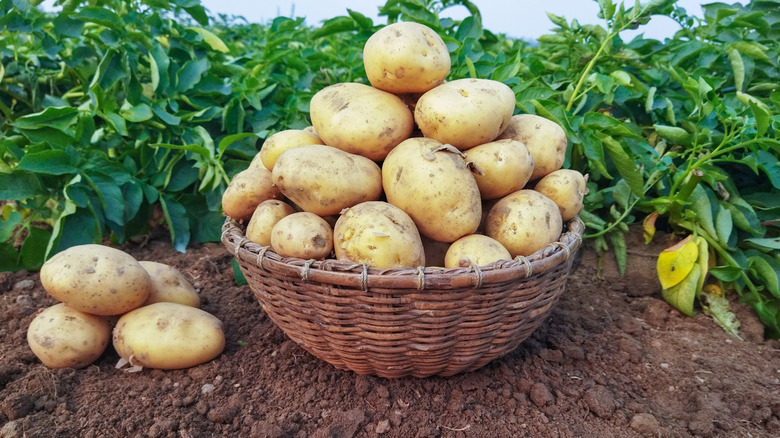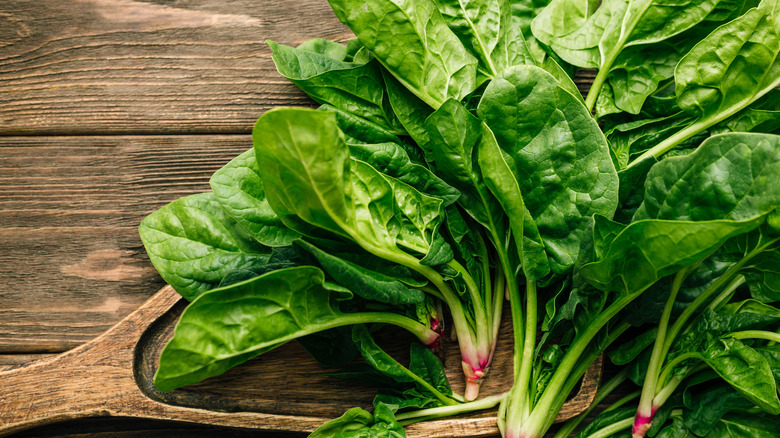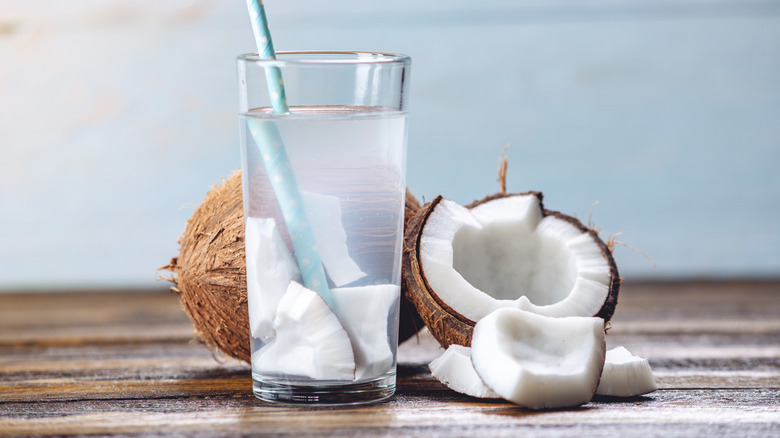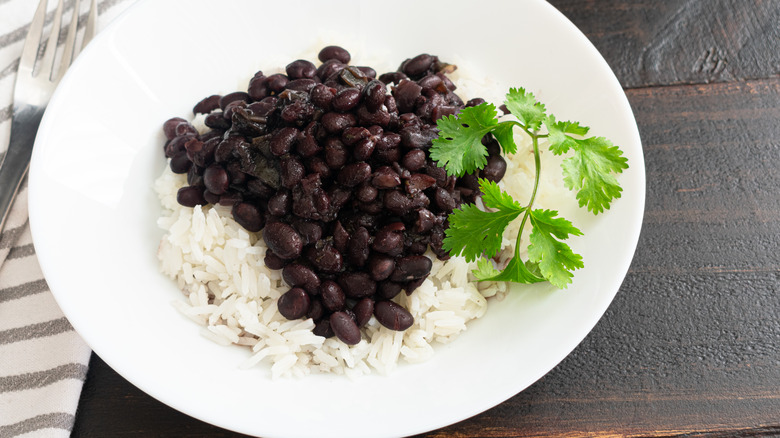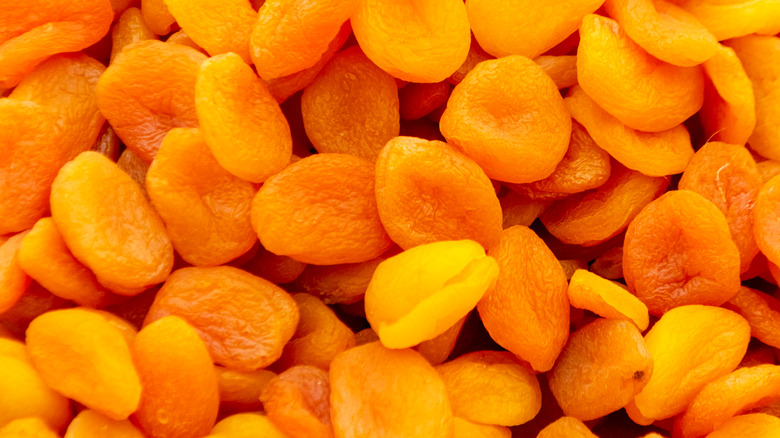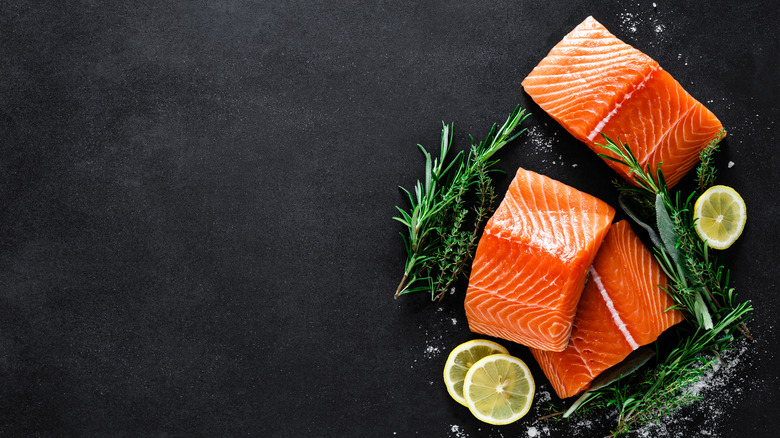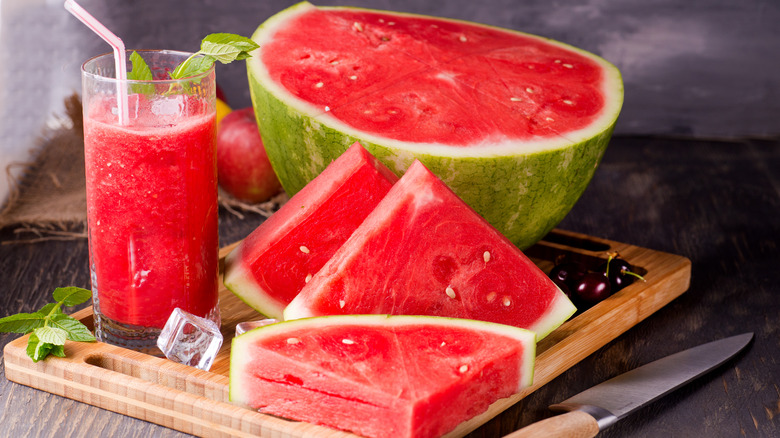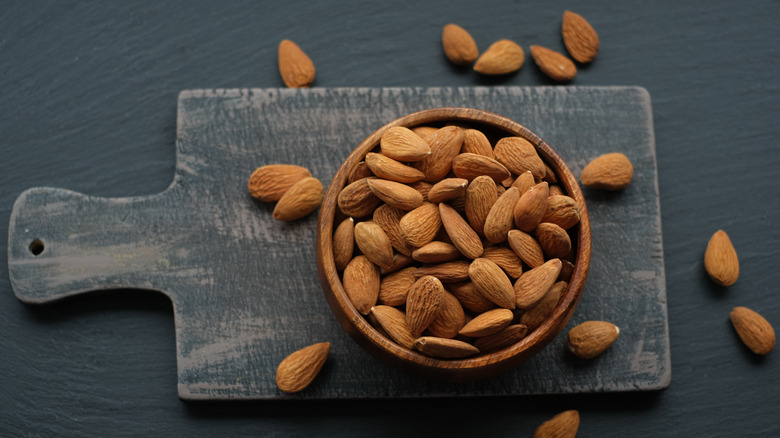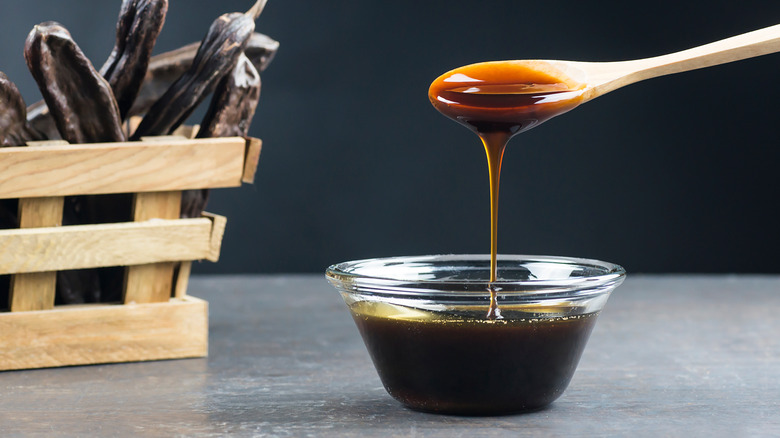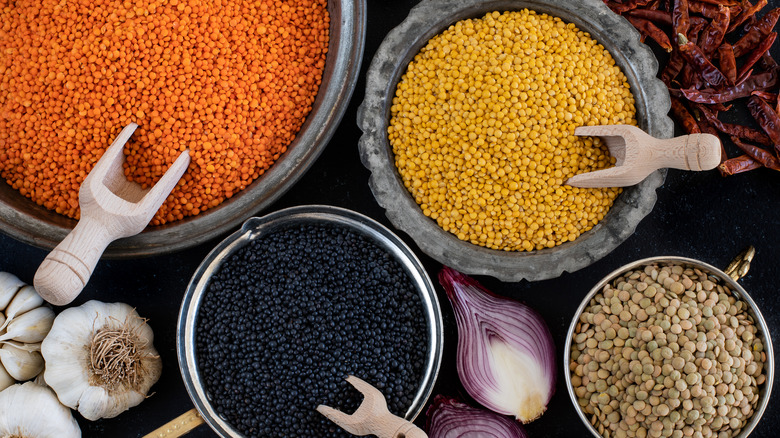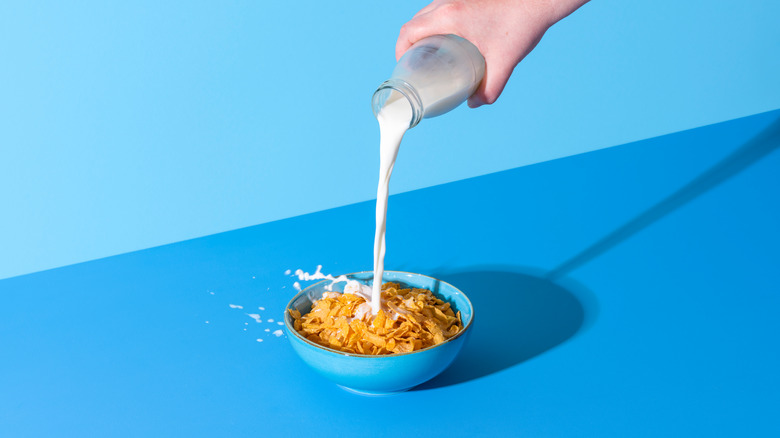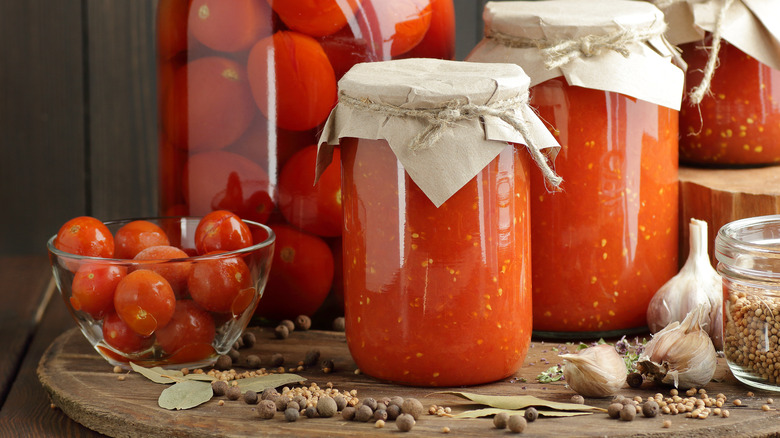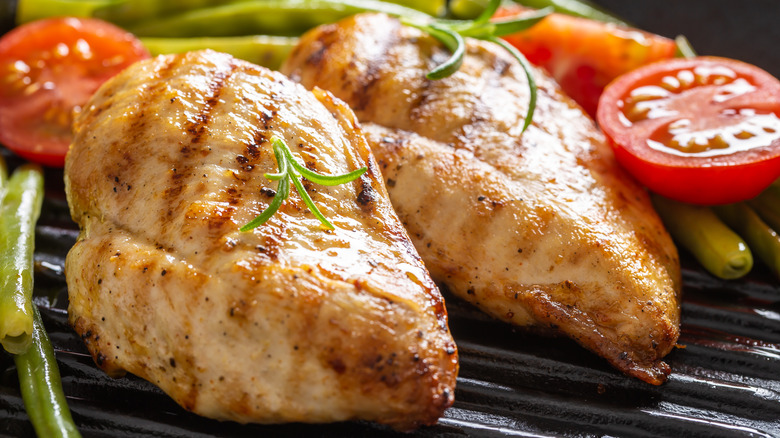Eat These Foods If You Need More Potassium
Have you ever looked at the label of a sports drink, emblazoned proudly with the words "contains potassium" on the label, and wondered whether it's really that important? We're here to tell you that the answer is yes: Among the 13 essential minerals (per MedicineNet) that the body needs to continue functioning at its best, potassium is arguably one of the most vital. The mineral and electrolyte is involved in a huge range of bodily functions, including the correct storage of glucose, nerve function, and muscle function, building, and contraction, according to Verywell Health. And that's not all, with registered dietitian Anna Taylor pointing out to the Cleveland Clinic that a potassium-rich diet "may reduce the risk of high blood pressure and stroke" when combined with reduced intake of sodium.
But where does potassium actually come from in our diets? Ask anyone that question, and they'll almost universally point you in the direction of a banana, with a medium-sized fruit containing roughly 422 mg of potassium per serving, almost 10% of our daily adult requirement (per Medical News Today). However, while we're big fans of bananas, we're also inclined to think that a little variation did no one any harm, and the fact remains that there are a plethora of potassium-rich foods out there that can help you keep your levels in strong standing. Let's take a look at some of our top picks below.
Potatoes are one of the best sources of potassium
The wonders of a good potato never cease to surprise us. In addition to arguably being the most delicious, satisfying, versatile, and comforting of all of the vegetables (yes, we're firmly pro-potato, not sure if you can tell), potatoes also contain a super-substantial amount of potassium per serving. As Potato Goodness points out, a single potato weighing in at roughly 148 grams will deliver you with a fantastic 620 mg of potassium, which translates to about 15% of your lower daily recommended intake of 3,500 mg per day, with the upper limit recommended as 4,700 mg daily (per Healthline).
And, as part of our eternal effort to rescue potatoes from the reputation of being a health-devoid carb, it's also worth noting that potatoes contain a substantial amount of some other surprising nutrients, like vitamin C and B6. However, as Wendy Bazilian, a registered dietitian and fitness specialist certified by the American College of Sports Medicine, says to Byrdie, we should keep an eye on our intake of potatoes –- but only in the same way that we would for other foods. In the meantime, let's praise potatoes for their potassium portions.
The potassium in spinach helps with muscle function
Popeye loved spinach for its muscle-building qualities, and there's a very good reason why. Aside from the leafy green's nitrates converting in the body to nitric oxide — helping with muscle function through the increased delivery of oxygen to the muscles (per Healthline) — spinach also contains excellent levels of potassium, with one cup of raw spinach delivering 167 mg of potassium, and one cooked cup clocking in at a hefty 840 mg of the mineral, according to Livestrong. This potassium, as registered dietitian and The Better Nutrition Program founder Ashley Koff told the Daily Burn, aids with healthy muscle contraction and delivers essential nutrients to muscles, helping to increase performance.
So, if you're looking to boost your potassium levels and supercharge your workout, spinach is the way to go. We can relate deeply, though, to the fact that eating cups of raw spinach daily may not exactly be a thrilling prospect, so if you're looking for some innovative ways to prepare the veg, Delish has you covered with recipes ranging from cheesy spinach artichoke bagels to mouth-watering spinach and white bean soup.
Orange juice is potassium-rich -- but look for other sources
Pretty much every bottle of orange juice you see proudly proclaims its vitamin C content to the world, but the breakfast drink's got a little more going for it than that. Your morning glass of OJ actually has a phenomenal level of potassium in it for a comparatively small serving size, with an 8-ounce glass containing approximately 10% of your daily potassium intake, according to Florida Citrus. This is roughly equivalent to the level of potassium in one medium banana –- so if your breakfast is a fruit-heavy affair, you could be getting a huge amount of your daily potassium in one meal.
While orange juice is excellent for its potassium content, though, it's important to point out that seeking potassium only from this drink might leave you with a few consequences. The director of the National Center or Weight and Wellness Scott Kahan says rather bluntly to Insider that "orange juice isn't a health food," pointing toward its frequently high sugar content that comparable to the levels of sugar per serving in a soda. In particular, Kahan advises people who have diabetes to be particularly careful about over-consuming orange juice and other sugary drinks, thanks to its effects on heightening blood sugar.
The potassium in coconut water helps you hydrate
In the sports beverage world, there's one drink that seems to reign above all others in terms of its healthiness and ability to restore you after exercise: coconut water. And there's a good reason for that. Aside from water, coconut water is one of the best drinks you can turn to after a workout session, largely due to its potassium content. According to WebMD, unflavored coconut water contains, on average, 61 milligrams of potassium per ounce, an incredible amount of the mineral -– particularly when you consider that fellow sports drinks like Gatorade contain less than 4 mg of potassium per ounce. Additionally, coconut water contains less sodium and less sugar than a lot of other sports drinks and clocks in at just over 5 calories per ounce serving.
However, before you switch to an all-coconut-water fluid intake from here on in, it's important to remember that, as sports nutritionist and "Nancy Clark's Sports Nutrition Guidebook" author Nancy Clark told WebMD, the drink doesn't act as a magic rehydration elixir. Coconut water will only adequately rehydrate you, Clark states, if you're able to drink enough of it. For proper rehydration, make sure you're drinking ample amounts of water following exercise as well.
Black beans are high in potassium, but watch their sodium content
Honestly, we don't think beans get enough love. In addition to being packed with protein and fiber, low-cost, and easy to put into a huge range of meals, some bean varieties like black beans are particularly dense in potassium, according to Medical News Today. These little nutritional powerhouses deliver a whopping 305 mg of potassium per half-cup serving in addition to 7.5 grams of fiber, roughly the same amount of protein, and also contain the minerals zinc, manganese, copper, magnesium, iron, phosphorus, selenium, and calcium, and a healthy dose of B vitamins. Honestly, Jack and the Beanstalk had it spot on –- beans are magic.
When you're selecting your black beans, though, make sure you're looking at one thing in particular on the label — namely, the sodium content. As Verywell Fit points out, in their canned form black beans can contain a surprisingly high amount of sodium per serving due to the salt added to preserve them and extend their shelf life. For this reason, try as much as possible to buy them fresh, or rinse them once removing them from the can to wash off excess sodium.
Dried apricots' potassium may outweigh their sugar levels
Food that's sweet, eminently snackable and transportable, and high in essential minerals? Sign us up! Such is the case with dried apricots, an all-around underappreciated snack food and which clock in highly –- very highly, in fact –- on the potassium front. According to WebMD, a mere half-cup serving of dried apricots will deliver a massive 1,100 mg of potassium, which amounts to 25% of your daily intake in one go. Not bad, right? And if that wasn't enough, these dried fruits are also plentiful in fiber and can deliver powerful antioxidant effects.
One thing that's useful to remember when snacking on dried apricots, however, is their sugar content. As Livestrong points out, a quarter-cup serving of dried apricots (roughly 28 grams) will provide around 15 grams of sugar. However, according to registered dietitian nutritionist Kaleigh McMordie, writing for Today's Dietitian, it's important to remember that the sugars in dried fruits are naturally-occurring as opposed to added, meaning that the insulin response invoked by them is usually stable. That's why nutrition consultant and registered dietitian nutritionist Chelsey Amer says in the same publication that "if you choose dried fruit with minimal sugar, the fiber, vitamins, and minerals far outweigh a little bit of sweetness."
When it comes to fish, salmon is one of the best for potassium
When it comes to potassium, we generally look toward plant-based foods like vegetables, fruits, beans, and pulses for our dietary sources. But potassium also exists in plentiful quantities in a lot of meat and fish products, and salmon is a particularly good protein to choose for this. According to the U.S. Department of Agriculture (USDA), half of a large fillet of salmon (around 198 grams) contains an incredible 970 milligrams of potassium, well over a fifth of your daily upper recommended intake of 4,700 mg.
And as many people know, salmon's health benefits don't stop there. As New York-based registered dietitian nutritionist Keri Gans states to Health, salmon is particularly rich in vitamin A, can contribute good levels of vitamin D to your diet, can help your body to regulate healthy sleep patterns through the presence of tryptophan, and contains all-important omega-3 fatty acids. Regular intake of omega-3's, as Medical News Today points out, have been linked to everything from aiding memory and reducing cognitive decline to having powerful benefits to heart health and the prevention of stroke, as potassium also does. As such, eating salmon could provide a double-dose of health for your heart.
The potassium in waterrmelon helps it rehydrate you
It's somehow strangely easy to forget how nutritious watermelon is. Maybe it's because of its candy-like taste, or maybe because it's hard to believe that something that fluorescent in color could be good for you. Well, fans of watermelon can breathe easy in the fact that watermelon is a super-healthy snack, partly due to its potassium content. As Medical News Today points out, one cup of watermelon contains a very generous 172 milligrams of potassium, as well as amounts of the fellow minerals phosphorus, magnesium, and calcium.
As well as that, watermelons are also a great vehicle for antioxidants, which help to fight against free radicals in the body and prevent long-term cellular damage and chronic disease (per Healthline). And somewhat unsurprisingly, watermelon is full of –- you guessed it! –- water, with the fruit composed of 90% liquids, meaning that it's a great snack to help you stay hydrated. And this hydrating quality is aided by the potassium content. As an electrolyte, potassium helps to regulate sodium content and fluid balance in our blood plasma and our cells, says registered dietitian nutritionist Donna P. Feldman for Active, making ample consumption of it super important.
As a snack, almonds are a great choice if you need potassium
It's all too easy to reach for the nearest bag of chips between breakfast, lunch, and dinner, but when we're feeling a little peckish, the right choice of snack should provide a mid-meal nutritional boost. Opting for almonds is a great way to do this, not least for their potassium content. As California Almonds states, a single-ounce serving of almonds (which is roughly a handful, or around 23 individual almonds if you're counting them out) will deliver 210 mg of potassium, 4% of our daily value. While this may not seem like much potassium, as snacks go, almonds are up there in the amount they provide.
The potassium in almonds plays a valuable role in helping to protect your heart health, regulating your heartbeat and aiding in the lowering of blood pressure (per WebMD), which adds to the nuts' already heart-healthy status, as California Almonds points out. And if almonds aren't your thing, never fear –- there are plenty of nuts and seeds which come packed with potassium, with My Food Data advising that pistachios, hazelnuts, brazil nuts, dry roasted peanuts, pine nuts, and sunflower seeds are all potassium-rich options.
Molasses will sweeten your meal and boost your potassium intake
Sometimes, you just need things a little sweeter. And for those moments in life (and for some of us, they are many), molasses could be a more nutritious alternative than adding regular white sugar, not least for the syrup's premium potassium content. Molasses, created from crushed sugar beets or sugar cane, can deliver a pretty hefty dose of potassium per tablespoon serving (roughly 20 grams), providing approximately 6%of your daily value in one go (per Medical News Today).
And interestingly, despite the high sugar content of molasses (the vast majority of its carbohydrate count comes from its sugar content), it could in some cases help to stabilize blood sugar for adults who follow a higher-carb diet. This could be due to potassium's ability to lower blood sugar, thanks to the mineral's function around helping the body to release insulin (via WebMD). It's worth pointing out, however, that the glycemic index rating of molasses is very close to that of refined sugars (via Medical News Today), meaning it can raise blood sugar levels very quickly — and eating too much sugar in any form can result in complications.
All types of lentils are good for potassium
You've got to love a lentil. These tiny pulses contain an almost astounding level of nutrition, and they're one of the best things you can eat if you need more potassium in your diet. Brooklyn-based registered dietitian Anthea Levi writes in Nutritious Life that all of the major types of lentils –- green, black, red, and brown lentils –- contain excellent levels of potassium per serving. While all of them can provide ample amounts of the mineral, green, red, and brown lentils clock in slightly higher, delivering around 10% of your daily value of potassium per quarter-cup when dried. Black lentils provide slightly less potassium for the same amount, giving around 6% of your daily value, says Levi.
As nutritionist Kerry Torrens writes in BBC Good Food, this potassium content, along with the folate and fiber present in the lentils, helps to manage and lower cholesterol and blood pressure, making them a great, heart-healthy choice. And the best part is, lentils are endlessly versatile, at home in a wide range of dishes, and can be used to make anything from a salad to a vegetarian shepherd's pie to falafel, as Self states.
The potassium in milk is high -- and not just in cow's milk
Sometimes it doesn't get better than a good glass of milk. And aside from milk's all-time classic status as a comfort staple, it's also one of the best things to drink if you need more potassium in your diet. As Healthline states, a single cup of milk can contain up to 380 mg of potassium, while chocolate milk is even more potassium-rich, with a sizeable 420 mg per cup serving. While milk may be a good option for people needing more potassium, it's best avoided if you have kidney disease — for which a low-potassium diet of 1,500-2000 mg a day is suggested — or any other conditions which make higher potassium consumption problematic.
And, if you need more potassium but you don't drink regular cow's milk, never fear –- you can get a good amount of potassium from milk alternatives. Soy milk, for example, contains a good amount of potassium per serving, as well as other minerals, including the calcium present in normal milk that gives it its bone-building benefits (per WebMD).
Tomatoes, in most forms, will deliver a strong potassium kick
Between ketchup, sugary tomato sauce, and canned tomato soups, it's easy to forget that tomatoes in their pure form are almost ridiculously good for you. This is especially true when it comes to their potassium content, with a cup of fresh tomatoes clocking in at 400 mg of potassium per serving, according to The Nephron Information Center. When they're concentrated by being turned into a puree or paste, their potassium level is even more intense, too, with a cup of tomato puree delivering 1,065 mg of the mineral, and tomato paste's potassium content being 2,455 mg for the same serving size.
Now if you need extra potassium in your diet, this is of course ideal –- but if you need to limit potassium for health reasons, it's hard to avoid the ubiquity of a tomato. The National Kidney Foundation has some good tips on how to make choices that limit tomatoes (and therefore potassium) when it comes to certain cuisines, such as opting for non-tomato-based sauces for pasta dishes, or avoiding salsa verde, which is made with green tomatoes that still carry a high potassium level.
As meats go, chicken is higher in potassium
Have you had chicken recently? You wouldn't be alone if you have. In 2020, broiler chicken was the most consumed meat in the U.S., with a mammoth 96.4 pounds consumed per capita, according to Statista. And all those chicken dinners are good news for people who need more potassium in their diet, as chicken is a meat that can deliver an excellent amount of the electrolyte. As the USDA shows, just half a chicken breast with the bone and skin removed (roughly 86 grams) contains 220 mg of potassium, as well as quantities of phosphorus and magnesium.
Meat in general, however, is usually not considered high-potassium — the highest quantities of the mineral come mostly from plant-based foods, according to Livestrong. If you need to keep your potassium levels low for certain reasons, however, avoiding chicken is a good idea –- as well as meats like pork chops, which contains 270 mg of potassium per 100 g. Instead, opt for lower-potassium options like cooked chuck, corned beef brisket, or lamb shoulder, with lamb being particularly low in potassium at 82 mg per 100 g of meat.

